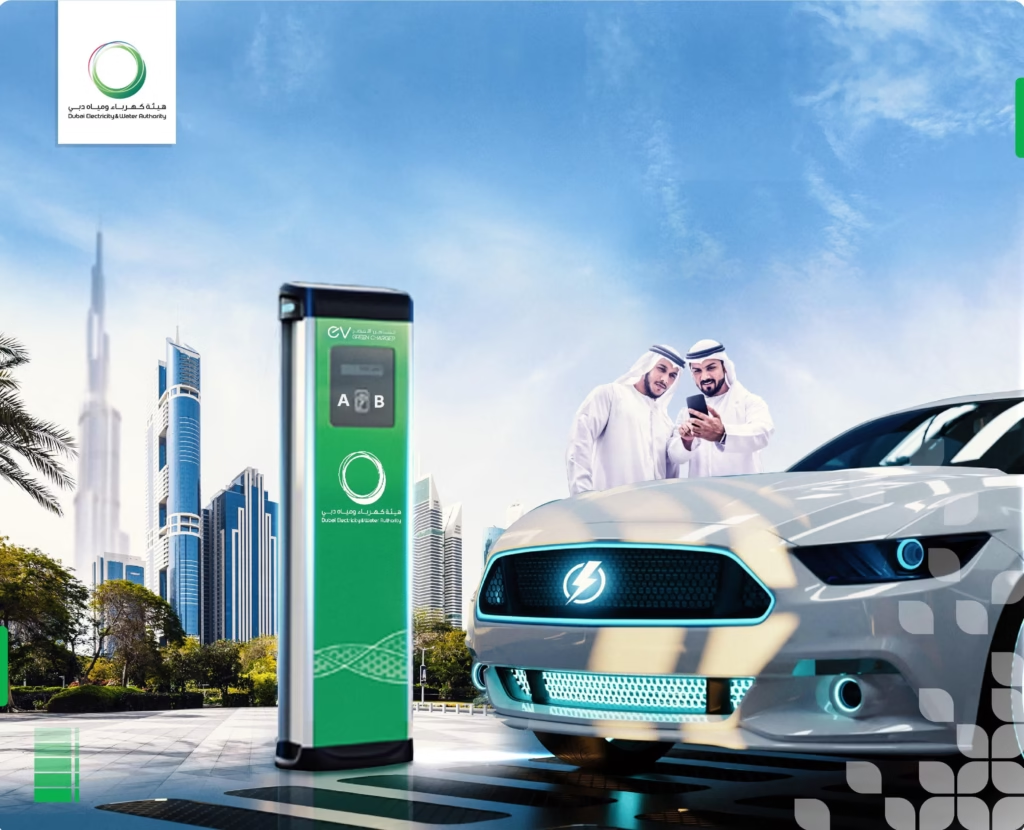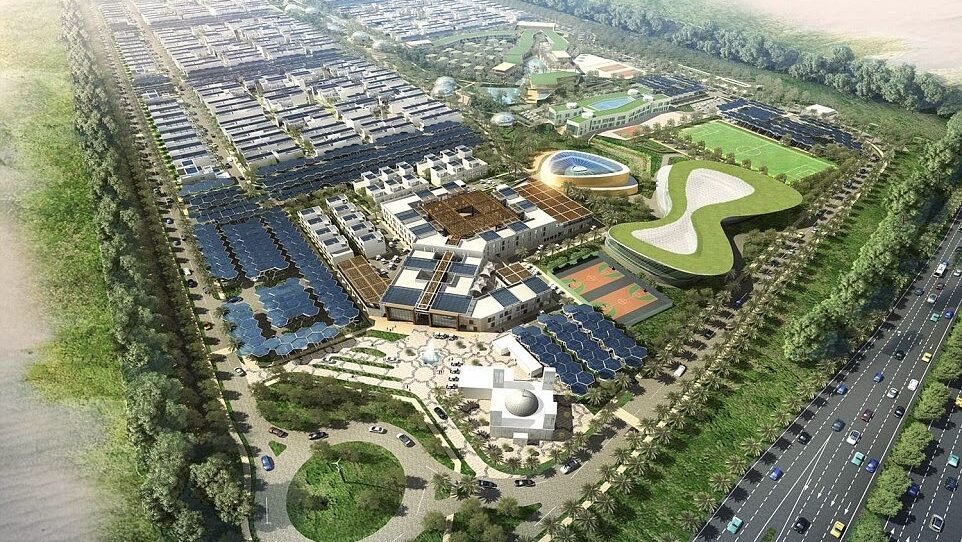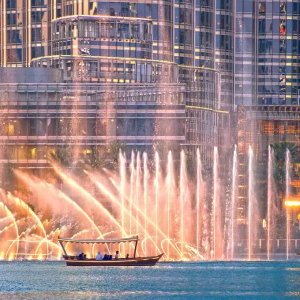Dubai, a city known for its towering skyscrapers, luxurious shopping malls, and vibrant nightlife, is now also making headlines for its bold environmental efforts. As part of its commitment to a sustainable future, Dubai has rolled out a series of green initiatives that are transforming the city’s approach to urban development, energy consumption, and environmental conservation. The city, which once seemed to prioritize rapid urbanization over sustainability, is now positioning itself as a global leader in green development.

With ambitious projects aimed at reducing carbon emissions, promoting clean energy, and preserving natural resources, Dubai’s transformation into a smart, green city is underway. In this article, we will explore some of the most innovative green initiatives in Dubai and examine how the city is paving the way for a sustainable future.
1. Dubai’s Clean Energy Strategy: Aiming for 100% Clean Power
Dubai’s Clean Energy Strategy 2050 is one of the cornerstones of its green ambitions. Launched in 2015, the strategy aims to provide 75% of the city’s energy from clean sources by 2050. This bold move positions Dubai at the forefront of the global push towards sustainability and environmental conservation.

One of the most significant components of this strategy is the Mohammed bin Rashid Al Maktoum Solar Park, which is the largest single-site solar park in the world. The park is a clear symbol of Dubai’s commitment to reducing its dependence on fossil fuels and generating cleaner energy. The park’s goal is to produce 5,000 megawatts (MW) of solar power by 2030, enough to power millions of homes across the city.
Dubai is also focusing on nuclear power, wind energy, and solar rooftops in its quest to meet its renewable energy targets. This multi-faceted approach to clean energy is helping to ensure that the city’s future is powered by sustainable resources, not just oil and gas.

2. Sustainable Urban Development: The Rise of Green Buildings
Dubai is known for its futuristic skyline, but as the city grows, it is also focusing on sustainable urban planning. Sustainable buildings are at the heart of this transformation. The city is home to some of the world’s most eco-friendly structures, and the government has introduced a variety of incentives and regulations to encourage green construction.
One example of a sustainable building is the Dubai Sustainable City, a fully integrated community that aims to reduce carbon emissions by 50% compared to traditional urban developments. The city is powered by solar energy, with homes designed to be energy-efficient. Additionally, it features smart technologies that help conserve water, reduce waste, and improve the overall environmental impact.
Dubai’s Green Building Regulations, which were introduced in 2011, mandate that new buildings comply with sustainability standards, including energy-efficient designs, water-saving fixtures, and the use of renewable energy sources. The regulations have pushed developers to build more eco-friendly structures, and the city now boasts an increasing number of LEED-certified buildings (Leadership in Energy and Environmental Design).
3. Promoting Electric Vehicles (EVs)

As part of its push towards a greener future, Dubai is also focusing on reducing air pollution caused by traffic. The government has introduced a number of initiatives to promote electric vehicles (EVs) in the city, aiming to make Dubai one of the world’s leading cities for electric mobility.
The Dubai Green Mobility Initiative, launched in 2018, focuses on increasing the use of electric cars and hybrid vehicles, providing citizens and businesses with incentives to make the switch to cleaner transportation options. As part of this initiative, the government has introduced a network of EV charging stations across the city, making it easier for drivers to charge their electric cars on the go.
Dubai’s RTA (Roads and Transport Authority) is also leading the way by integrating electric and hybrid buses into its public transport network. The authority has set a target to make 25% of all public transport vehicles in the city electric by 2030. With these efforts, Dubai is not only reducing its carbon footprint but also paving the way for a cleaner and more efficient transportation system.
4. Waste Management and Recycling: Reducing Landfill Waste
Waste management is another critical area of focus for Dubai. The city’s growing population and high levels of consumption have led to an increase in waste generation, but the government is taking steps to reduce landfill waste and improve recycling efforts.
One of the key initiatives in this area is the Dubai Integrated Waste Management Master Plan, which aims to divert 75% of all waste from landfills by 2025. This ambitious goal is being achieved through a combination of waste-to-energy plants, recycling programs, and public awareness campaigns.
Dubai has also launched the Dubai Clean Energy Strategy, which aims to develop a comprehensive waste management system that includes waste sorting, recycling, and composting. The Dubai Municipality has partnered with private companies to build state-of-the-art recycling facilities that process everything from plastics to electronic waste. Additionally, Dubai is increasingly relying on waste-to-energy technologies, which convert waste into electricity, further reducing the burden on landfills.
5. Water Conservation: Ensuring a Sustainable Future
Water is a precious resource in the UAE, and Dubai is taking proactive steps to ensure that it is used efficiently. The government is investing heavily in water conservation programs, including the use of desalination technologies and the promotion of water-saving measures across the city.
The Dubai Water Canal, a massive project that connects the city’s waterways to the Arabian Gulf, is designed not only to enhance the city’s landscape but also to improve water management in the region. The canal includes water treatment plants that purify water, ensuring that it can be reused for irrigation and other purposes.
Dubai is also implementing policies to reduce water consumption in residential, commercial, and industrial sectors. The Dubai Integrated Energy Strategy aims to reduce water use by 30% by 2030, encouraging residents to adopt water-efficient practices and install water-saving appliances.
6. Environmental Awareness and Green Certifications
Another key aspect of Dubai’s green initiatives is the promotion of environmental awareness among its residents and businesses. The government has partnered with environmental organizations and green certification bodies to encourage the adoption of sustainable practices.
The Dubai Green Building Council and other local organizations are working to raise awareness about sustainability and provide resources for businesses to become more environmentally friendly. The Dubai Carbon Centre of Excellence also plays a crucial role in helping companies reduce their carbon emissions and achieve sustainability certifications.
In addition to these initiatives, Dubai is hosting a range of environmental events and green expos, such as the World Green Economy Summit, which brings together global leaders to discuss solutions for a sustainable future.
Conclusion: A Greener Future for Dubai
Dubai’s ambitious green initiatives are setting the city on a path towards a more sustainable future. Through investments in clean energy, sustainable buildings, electric vehicles, waste management, water conservation, and environmental awareness, Dubai is proving that sustainability and modern urban development can go hand in hand.
As the city continues to grow and evolve, its commitment to environmental responsibility will only deepen. By 2050, Dubai aims to become one of the world’s most sustainable cities, setting a global example for others to follow. With a clear vision and innovative solutions, Dubai is demonstrating that it is possible to create a vibrant, thriving city while also protecting the planet for future generations.
Also read: The Rise of Digital Currency in the UAE: Shaping the Future of Finance












